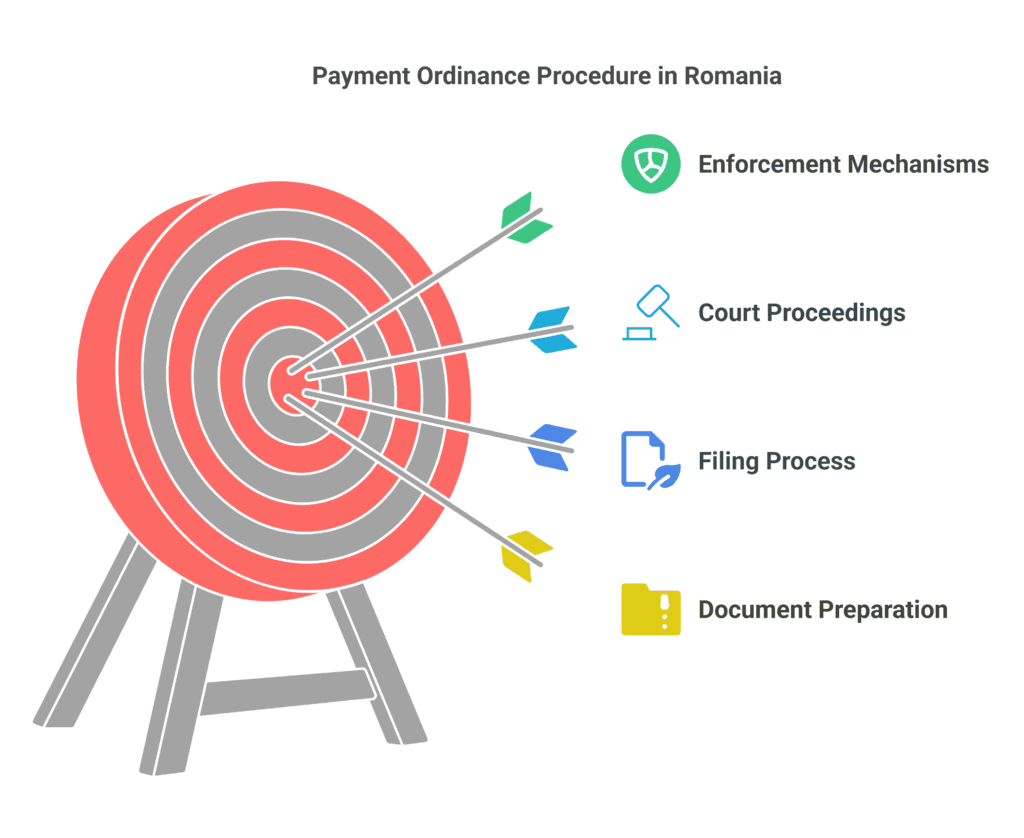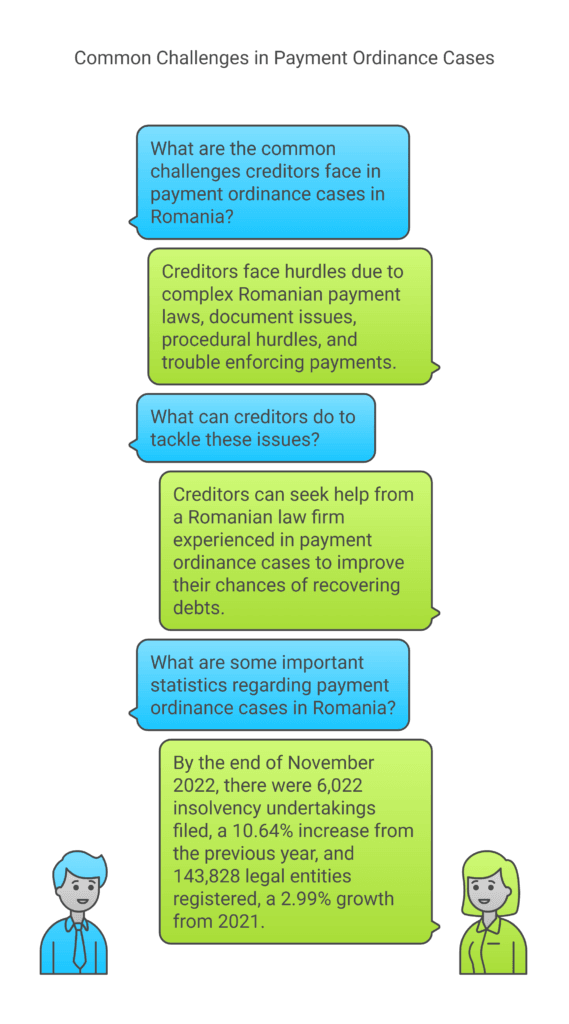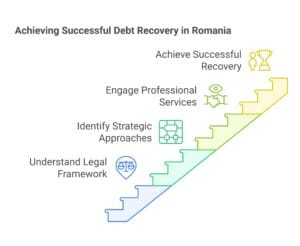Payment Ordinance Procedure in Romania – Bucharest Lawyers
Payment Ordinance Procedure in Romania – Bucharest Lawyers
Are you having trouble getting debts paid back in Romania?
You might want to know about the payment ordinance procedure.
It’s fast, with debtors needing to pay within 15 days after getting a notice.
Lawyers in Bucharest can guide you through this process, helping you understand the rules and laws.
Introduction to Payment Ordinance Procedure
The payment ordinance procedure in Romania helps creditors get their money back.
It starts with filing a payment ordinance with the court.
Then, the court sends a payment order to the debtor.
Our Lawyers in Bucharest can help you with this, making sure you follow the rules and laws.
Key Takeaways
- The payment ordinance procedure in Romania is a fast method for debt recovery.
- The debtor must pay the debt within 15 days of receiving the payment notice, as per the payment rules in Romania.
- Lawyers in Bucharest, Romania can provide expert guidance on the payment ordinance procedure.
- The payment ordinance procedure involves filing a payment ordinance with the court.
- The court issues a payment order to the debtor, who must comply with the payment laws in Romania.
- creditors can navigate the payment rules in Romania with the help of lawyers in Bucharest, Romania.
Understanding the Payment Ordinance Framework in Romania
To understand the payment ordinance procedure in Romania, knowing the legal basis is key.
The framework is based on the Romanian Civil Procedure Code.
It’s part of the broader laws on payments in Romania, aimed at making debt recovery efficient.
The payment ordinance procedure only applies to certain debts.
Not all debts can be recovered this way.
It’s important to know if a claim fits within this framework.
The laws and regulations in Romania help shape this framework, ensuring it meets European standards.
The payment ordinance framework is based on the Romanian Civil Procedure Code.
It applies to specific claims.
This makes it a simpler way to recover debts for individuals and businesses in Romania.
Understanding this framework helps in navigating debt recovery processes better.
The payment ordinance procedure is governed by specific rules in the Romanian Civil Procedure Code.
This ensures it follows the payment legislation in Romania.
This framework is vital for the procedure’s integrity and effectiveness, providing a clear process for debt recovery.
Essential Requirements for Filing a Payment Ordinance
To file a payment ordinance, you need to follow certain rules.
The Romanian Civil Procedure Code outlines these rules.
You must show proof of the debt, like a written contract.
It’s important to know the Romanian payment laws and regulations.
This helps ensure the payment ordinance is filed right.
The payment legislation in Romania has specific rules.
The creditor must offer guarantees that cover the debt and any future interests.
Taxpayers have 30 days to provide these guarantees after agreeing to the payment plan.
Some key points to consider when filing a payment ordinance include:
- Providing evidence of the debt, such as a written contract or agreement;
- Meeting the requirements specified in the Romanian Civil Procedure Code;
- Understanding the payment regulations in Romania and the payment legislation in Romania.
By following these essential steps, you can file the payment ordinance correctly.
This helps you recover the debt effectively.
Knowing the payment ordinance requirements and Romanian payment laws is key to success.
The Payment Ordinance Procedure in Romania: Step-by-Step Guide
The process begins with a formal demand letter to the debtor.
This letter asks for payment within 15 days.
The payment ordinance procedure has several steps.
These include preparing documents, filing them, going to court, and enforcing the order.
Following the Romanian payment laws is vital for a smooth process.
A well-drafted payment notice can greatly help in recovering debts.
- Document preparation: The creditor must prepare the necessary documents, including the payment ordinance and supporting evidence.
- Filing process: The creditor files the documents with the court, and the court issues a payment order to the debtor.
- Court proceedings: If the debtor fails to pay, the creditor can initiate enforcement proceedings.
- Enforcement mechanisms: The payment ordinance can be enforced if the debtor fails to comply within a specified period, usually 30 days.
Getting professional legal help is advised for the payment ordinance procedure.
A step-by-step guide can help creditors.
It ensures they follow the Romanian payment laws and payment legislation in Romania to recover debts effectively.

Legal Timeframes and Deadlines
Knowing the payment ordinance deadlines is key for both creditors and debtors in Romania.
The payment ordinance has specific times and deadlines.
For example, debtors have a certain time to pay their debts.
If they don’t, creditors can start enforcement actions.
The rules in Romania help the payment ordinance work well.
They make sure creditors can get their money back.
It’s important to know the rules, like when to file a payment ordinance and how long debtors have to respond.
These deadlines help keep the process fair and quick.
Some important deadlines include:
- The timeframe for the debtor to pay the debt;
- The deadline for the creditor to initiate enforcement proceedings;
- The timeframe for the debtor to respond to the payment ordinance.
Understanding the payment ordinance deadlines and rules in Romania helps both sides.
It’s vital to follow the law and meet deadlines for a good outcome.
Common Challenges in Payment Ordinance Cases
Dealing with payment ordinance cases in Romania can be tough.
Creditors often face hurdles in getting their debts back.
This is due to the complex Romanian payment laws and regulations.
Some common problems include issues with documents, procedural hurdles, and trouble enforcing payments.
Creditors must provide detailed documents to support their claims.
Any mistakes can cause delays or even stop the case.
Procedural issues, like problems with serving the debtor, can also happen.
Enforcement can be hard when debtors don’t follow the payment plan.
In these cases, creditors might need to take extra steps to get their money back.
To tackle these issues, creditors can get help from a law firm.
A Romanian law firm with experience in payment ordinance cases can guide them.
They can help understand the payment laws and regulations in Romania.
By getting professional help, creditors can improve their chances of recovering debts.
This way, they can also reduce the risks of facing payment ordinance challenges.
Some important statistics to keep in mind for payment ordinance cases in Romania include:
- 6,022 undertakings filed for insolvency in Romania by the end of November 2022, representing a 10.64% increase compared to the previous year.
- 143,828 legal entities or authorized natural persons registered with the Trade Registry as of November 2022, indicating a growth of 2.99% from 2021.

Role of Legal Representation in Payment Ordinance Procedures
Understanding the role of legal representation is key when dealing with payment ordinance procedures in Romania.
The process can be complex.
Creditors often find it helpful to get expert advice to make sure they’re on the right path.
Romanian payment laws and regulations can be hard to grasp, making legal help essential.
Lawyers who specialize in payment ordinance legal representation offer great support.
They help creditors understand the process and ensure they follow the right steps.
This way, creditors can avoid mistakes and make the most of their rights under Romanian payment laws.
Here are some benefits of getting professional legal help in payment ordinance procedures:
- Expert guidance on payment regulations in Romania;
- Assistance with navigating payment legislation in Romania;
- Representation in court proceedings;
- Help with enforcing payment ordinances.
Seeking advice from a Romanian law firm like Atrium can be very helpful.
Our debt collection Romanian Lawyers have deep knowledge of Romanian payment laws and regulations.
This means creditors can be confident their case is in capable hands.
Cost Considerations and Financial Implications
When dealing with the payment ordinance in Romania, costs are a big factor.
You’ll face court fees and enforcement costs.
Knowing the payment laws can help you save money.
The laws aim to help creditors get their money back, but be ready for the costs.
The economic growth in Romania, about 2% in 2023, might influence the payment process.
The country’s current account deficit went down from 9.3% of GDP in 2022 to 7.0% in 2023.
This change could affect the financial side of things. Getting advice from experts is key to understanding these costs.
Here’s a quick look at the main costs for the payment ordinance in Romania:
- Court fees: These vary by court and procedure.
- Enforcement costs: This includes fees for bailiffs, lawyers, and more.
- Legal fees: A lawyer can be expensive but helps save money in the long run.
Knowing the payment rules in Romania and the costs can help you make smart choices.
It’s important to get advice to save money and get the best results.
Conclusion: Securing Your Interests Through Professional Legal Support
When dealing with the payment ordinance in Romania, getting professional legal help is key.
Lawyers in Bucharest, Romania, who know about Romanian payment laws, payment regulations, and payment legislation can guide you.
They help you recover your debts effectively.
The payment ordinance process is complex.
Creditors who get legal advice are more likely to get good results.
Experienced Romanian attorneys protect your rights and interests.
Our specialized team of Romanian Lawyers explain the payment ordinance procedure, help you follow the right steps, and solve any problems.
This helps you protect your financial interests and get the money you’re owed.
FAQ
What is the payment ordinance procedure in Romania?
In Romania, the payment ordinance procedure helps creditors get their money back from debtors.
It starts with filing a payment ordinance with the court.
The court then sends a payment order to the debtor.
The debtor must pay the debt within a certain time.
If they don’t, the creditor can start enforcement actions.
What is the legal basis for the payment ordinance procedure in Romania?
The payment ordinance process in Romania is based on the Romanian Civil Procedure Code.
This code gives the legal foundation for the process.
What are the key requirements for filing a payment ordinance in Romania?
To file a payment ordinance, the creditor needs to show proof of the debt.
This can be a written contract or agreement.
They must also follow the rules in the Romanian Civil Procedure Code.
What are the steps involved in the payment ordinance procedure in Romania?
The payment ordinance process in Romania has several steps.
First, the creditor prepares the necessary documents.
Then, they file these documents with the court.
The court issues a payment order to the debtor after this.
This order tells the debtor to pay the debt.
What are the legal timeframes and deadlines for the payment ordinance procedure in Romania?
The payment ordinance process in Romania has specific time limits.
The debtor has a certain time to pay the debt.
If they don’t, the creditor can start enforcement actions.
What are the common challenges in payment ordinance cases in Romania?
In Romania, common challenges in payment ordinance cases include issues with documents and procedural obstacles.
Enforcement difficulties are also common.
How can legal representation benefit creditors in the payment ordinance procedure in Romania?
Legal help is very important in the payment ordinance process in Romania.
Lawyers can guide creditors through the process.
They can also help creditors understand their rights and obligations.
Lawyers can make navigating the legal system easier for creditors.
What are the cost implications of the payment ordinance procedure in Romania?
The payment ordinance process in Romania can be costly.
There are court fees and enforcement costs.
Creditors should get expert advice to reduce these costs.
What is the Payment Ordinance procedure in Romania?
The Payment Ordinance procedure in Romania is a special legal procedure designed for debt recovery.
It is governed by the Romanian Civil Procedure Code and allows creditors to obtain a court decision for the payment of a debt in a faster and more efficient manner compared to regular litigation.
This procedure is particularly useful for undisputed debts and aims to simplify the debt collection process in Romania.
Who can use the Payment Ordinance procedure in Romania?
The Payment Ordinance procedure can be used by both individuals and legal entities acting as creditors.
It is available for creditors seeking to recover monetary debts that are certain, liquid, and due.
This procedure is particularly useful for businesses, including those represented by Bucharest lawyers, seeking to recover outstanding payments from their debtors.
What are the main advantages of using the Payment Ordinance procedure?
The main advantages of the Payment Ordinance procedure include:
1. Faster resolution compared to standard litigation;
2. Simplified procedure with less formal requirements;
3. Lower legal fees and court fees;
4. Possibility to obtain an enforceable court decision in a shorter timeframe;
5. Applicable for both domestic and cross-border debt recovery cases within the EU.

